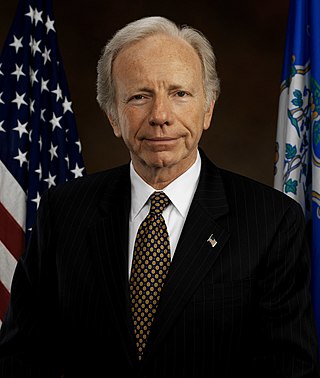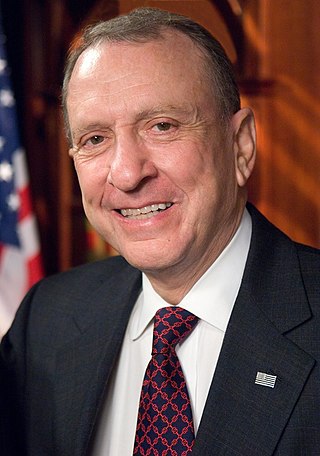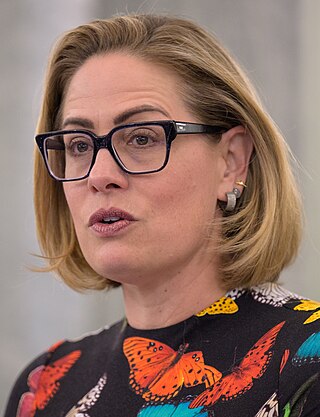Related Research Articles

Since Arizona became a U.S. state in 1912, it has sent congressional delegations to the United States Senate and United States House of Representatives, beginning with the 63rd United States Congress in 1913. Before becoming a state, the Arizona Territory elected a non-voting delegate at-large to Congress from 1864 to 1912. Each state elects two senators to serve for six years, and varying numbers of members of the House, depending on state population, to two-year terms. Arizona has sent nine members to the House in each delegation since the 2010 United States Census.

Joseph Isadore Lieberman was an American politician and lawyer who served as a United States senator from Connecticut from 1989 to 2013. A former member of the Democratic Party, he was its nominee for vice president of the United States in the 2000 U.S. presidential election. During his final term in office, he was officially listed as an independent Democrat and caucused with and chaired committees for the Democratic Party.

Arlen Specter was an American lawyer, author and politician who served as a United States Senator from Pennsylvania from 1981 to 2011. Specter was a Democrat from 1951 to 1965, then a Republican from 1965 until 2009, when he switched back to the Democratic Party. First elected in 1980, he was the longest-serving senator from Pennsylvania, having represented the state for 30 years.

The 2008 United States Senate elections were held on November 4, 2008, with 35 of the 100 seats in the Senate being contested. Thirty-three seats were up for regular elections; the winners were eligible to serve six-year terms from January 3, 2009, to January 3, 2015, as members of Class 2. There were also two special elections, the winners of those seats would finish the terms that ended on January 3, 2013. The presidential election, which was won by Democrat Barack Obama, elections for all House of Representatives seats; elections for several gubernatorial elections; and many state and local elections occurred on the same date.
In U.S. politics, an independent Democrat is an individual who loosely identifies with the ideals of the Democratic Party but chooses not to be a formal member of the party or is denied the Democratic nomination in a caucus or primary election. Independent Democrat is not a political party. Several elected officials, including members of Congress, have identified as independent Democrats.

Party divisions of United States Congresses have played a central role on the organization and operations of both chambers of the United States Congress—the Senate and the House of Representatives—since its establishment as the bicameral legislature of the Federal government of the United States in 1789. Political parties had not been anticipated when the U.S. Constitution was drafted in 1787, nor did they exist at the time the first Senate elections and House elections occurred in 1788 and 1789. Organized political parties developed in the U.S. in the 1790s, but political factions—from which organized parties evolved—began to appear almost immediately after the 1st Congress convened. Those who supported the Washington administration were referred to as "pro-administration" and would eventually form the Federalist Party, while those in opposition joined the emerging Democratic-Republican Party.

Kyrsten Lea Sinema is an American politician and former social worker serving as the senior United States senator from Arizona, a seat she has held since 2019. A former member of the Democratic Party, Sinema became an independent in December 2022.

Cindy Hyde-Smith is an American politician serving as the junior United States senator from Mississippi since 2018. A member of the Republican Party, she was previously the Mississippi Commissioner of Agriculture and Commerce and a member of the Mississippi State Senate.

The 118th United States Congress is the current meeting of the legislative branch of the United States federal government, composed of the United States Senate and the United States House of Representatives. It convened in Washington, D.C., on January 3, 2023, and will end on January 3, 2025, during the third and fourth years of President Joe Biden's term in office.

The 2022 United States Senate elections were held on November 8, 2022, concurrently with other midterm elections at the federal, state and local levels. Regularly scheduled elections were held for 34 of the 100 seats in the U.S. Senate, the winners of which will serve six-year terms beginning with the 118th United States Congress. Two special elections were held to complete unexpired terms. While pundits considered the Republican Party a slight favorite to gain control of the Senate, Senate Democrats outperformed expectations and expanded the majority they had held since 2021, gaining one seat for a functioning 51–49 majority.

Two 2022 United States Senate elections in California were held concurrently on November 8, 2022, to elect a member of the United States Senate to represent the State of California. There were two ballot items for the same Class 3 seat: a special election to fill the seat for the final weeks of the 117th United States Congress, and a general election for a full term, starting in the 118th United States Congress.

The 2024 United States elections are scheduled to be held on Tuesday, November 5, 2024. During this presidential election year, the president and vice president will be elected. In addition, all 435 seats in the United States House of Representatives and 34 of the 100 seats in the United States Senate will be contested to determine the membership of the 119th United States Congress. Thirteen state and territorial governorships and numerous other state and local elections will also be contested.

The 2024 United States Senate elections are scheduled to be held on November 5, 2024, as part of the 2024 United States elections. 33 of the 100 seats in the U.S. Senate will be contested in regular elections. Senators are divided into 3 classes whose six-year terms are staggered so that a different class is elected every 2 years. Class 1 senators will face election in 2024.

The 2024 United States Senate election in Arizona will be held on November 5, 2024, to elect a member of the United States Senate to represent the state of Arizona. Primary elections will take place on July 30, 2024.

The 2024 United States Senate election in Pennsylvania will be held on November 5, 2024, to elect a member of the United States Senate to represent the state of Pennsylvania. Primary elections took place on April 23, 2024. Incumbent three-term Democratic Senator Bob Casey Jr. announced his intention to run for a fourth term on April 10, 2023.

The 2022 United States Senate election in North Dakota was held on November 8, 2022, to elect a member of the United States Senate to represent the state of North Dakota. Incumbent Republican John Hoeven was first elected in 2010 with 76% of the vote to succeed retiring Democratic–NPL incumbent Byron Dorgan, and won re-election in 2016 with 78.5% of the vote. He ran for a re-election to a third term in office against Democratic-NPL nominee Katrina Christiansen. He also faced State Representative Rick Becker, who initially ran as a Republican in the primary, but suspended his campaign in August 2022 and instead ran as an Independent.

United States gubernatorial elections are scheduled to be held on November 5, 2024, in 11 states and two territories. The previous gubernatorial elections for this group of states took place in 2020, except in New Hampshire and Vermont where governors only serve two-year terms and elected their governors in 2022. In addition to state gubernatorial elections, the territories of American Samoa and Puerto Rico will also hold elections for their governors.
References
- ↑ "Senators Who Changed Parties During Senate Service (Since 1890)". United States Senate.
- ↑ "Longtime GOP Sen. Arlen Specter becomes Democrat". CNN . April 28, 2009. Retrieved April 28, 2009.
- ↑ "Sinema leaving the Democratic Party and registering as an independent". CNN . December 9, 2022. Retrieved December 9, 2022.
- ↑ Irwin, Lauren (2024-05-31). "Joe Manchin leaves Democratic Party, files as independent". The Hill. Retrieved 2024-05-31.